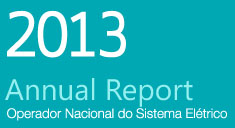Administration Board Message
Two relevant points
The year 2012 sets out another cycle of intense work of Operador Nacional do Sistema Elétrico - ONS, both in the fulfillment of its institutional mission - to ensure the security and economicity of electricity supply to consumers of the Brazilian Interconnected Power System - as in the continuous search for improvement of the organizational management.
The work of the Administration Board joins this integrated effort of the technical teams of the Operator, Associate Agents and other organizations that conduct the electric sector, contributing to this impressive set of positive results, both in the technical field and in the corporate management.
I highlight the efforts of the Commission of Counselors which examined the challenges and proposals for improvement of the processes for expansion of generation and power transmission. The objective was to identify the impact on the operation of the BIPS of a process of planning and expansion in which has prevailed hydroelectric generation without reservoirs and the intermittent generation, as well as to propose enhancements.
Among the challenges mentioned, it is possible to highlight: the need of holding regional auctions and by source type, the need to restrain the loss of regularization of the reservoir system capability, the need to increase basic thermal generation also considering new technology to reduce CO2 emissions, the need to accommodate large amounts of intermittent generation to meet the load, the need to improve operating security mechanisms, and the specific needs of regulation, implementation and operation of transmission grids.
The second point I would like to comment on was the process of review and improvement of the Operator Management Plan for Jobs and Remuneration. Formulated from a comprehensive internal work, the proposal made possible by the Commission of Counselors sought to ensure the sustainability of the organization, making it able to attract and retain highly qualified human resources necessary to the holding of its institutional mission. At the same time, we sought a modern formulation in order to promote the rationalization of staff costs. The approval of the proposal sent by the Board in its entirety shows that we are in the right direction.
I also highlight the positive outcomes of the project of deployment of the Operator new facilities in Florianopolis, Recife and Rio de Janeiro, which will elevate the organization to a new level in terms of physical environment in a short time.
I am sure the evolution of these issues will lead to a fully trained Operator to coordinate the operation of a system becoming larger and more complex, expanded from the perspective of the commitment to future generations, and that can meet an increasing energy demand per capita. Adding the dedication and expertise of its technical staff to the management ability of the Board of Directors and the reliable guidance of its Administration and Fiscal Boards, all of the challenges that the future will bring will be overcome.
Maurício Stolle Bähr
President of the Administration Board
